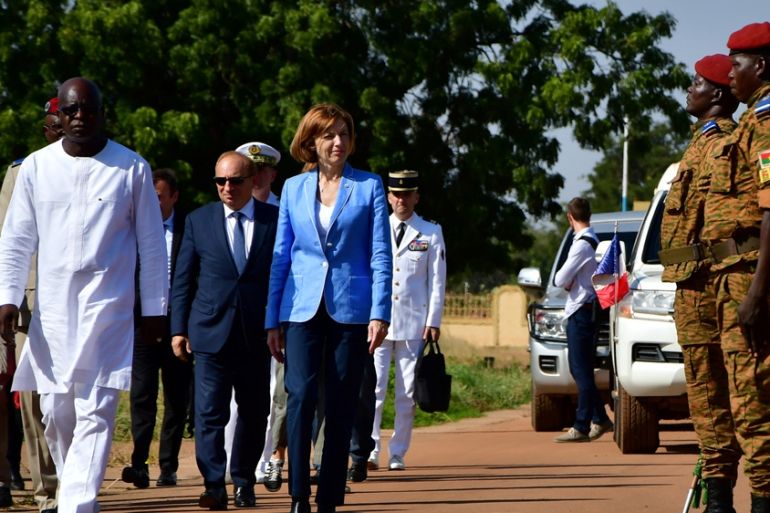France announces troop deployment to Burkina Faso
Sources suggest French operation has already started and being carried out at request of Burkinabe authorities.

Ouagadougou, Burkina Faso – Florence Parly, the French minister of armed forces, has announced her country will be deploying ground troops to the “three borders” area of Burkina Faso.
During a visit to the country’s capital, Ouagadougou, she said on Monday, “the launch of operation ‘Bourgou 4’ will be led by Barkhane [France’s military operation in the Sahel region of Africa], but with the eminent contribution of two Burkinabe companies. The operation will take place in the coming days in the three border area, which is where there is most need.”
Keep reading
list of 3 itemsMore than a dozen killed in Burkina Faso mosque attack
In Pictures: The dancing prisoners of Burkina Faso
Sources in Burkina Faso suggest the operation has already started and is being carried out at the request of the Burkinabe authorities.
The move represents an expansion of France‘s operation in the Sahel which, until now, has deployed the majority of its 4,500 troops to other countries in the region including Mali, Niger and Chad over five years.
Although it has given air support to Burkinabe troops and small numbers of French troops are known to have operated in the country for some time, Parly’s announcement represents France’s first major commitment of ground troops in Burkina Faso.
Mathieu Pellerin, an analyst for the International Crisis Group, a think-tank based in Brussels, told Al Jazeera: “Even if this French deployment may limit the ability of jihadist groups to expand, we can expect jihadist activities to transition towards areas that will not be directly targeted by French operations in the western, southern and eastern parts of Burkina Faso like jihadist groups have always done.”
The “three borders area” of the country is where Burkina Faso’s border meets those of Mali and Niger, a region that has seen much of the violence carried out by armed groups since 2015.
Troops from other countries allied under the G5 Sahel Force, a military alliance set up by Sahelian countries to combat armed rebellion activities in the region, will also participate in the operation.
French ‘plunder’?
Some in Burkina Faso are against the involvement of French troops in the country and see it as symbolic of too much French influence and a throwback to the colonisation era.
“The Burkinabe who oppose it think that … if the French soldiers are there it is to protect either [France’s] interests or to settle on resource-rich areas and plunder on behalf of France,” Basidou Kinda, a local journalist who covers security in the region, told Al Jazeera.
However, the Burkinabe army has so far proven incapable of preventing the conflict alone.
“The deteriorating situation is worrying and the Burkinabe authorities have been forced to call on French support to try to limit this degradation – even if they are concerned about the degree to which they can keep control of military operations,” Pellerin said.
Other Burkinabes welcomed the French military deployment. An editorial on the news site Le Pays said: “While waiting to see the operationalisation of this great fight against jihadists … we can welcome this good news.”
|
|
Daily violence
Burkina Faso is suffering intense violence as rebel groups including Ansar ul Islam, Jama’at Nasr al-Islam wal Muslimin (JNIM) and the Islamic State in the Greater Sahara (ISGS), carry out attacks in the country on an almost daily basis. So far this year, the conflict has killed nearly 1,700 people.
On Sunday, a Burkinabe member or parliament was assassinated by unidentified gunmen in the north of the country.
“The military answer to jihadism is a way to deal with the consequences, not the causes of the development of local insurgency groups which are committed to local grievances caused by a system of governance which produces inequalities, whether it is the judiciary system, governance over natural resources, or the governance of the defence and security forces,” Pellerin said.
“It is up to the Burkinabe authorities to do this through an awareness of this reality on the one hand, and through the development of a clear holistic strategy on the other,” he added.
Landlocked Burkina Faso is considered a strategic linchpin in the Sahel region. Analysts fear the violence in Burkina Faso may spread beyond its borders to countries on the West African coast, such as Ghana, Togo and Benin.
The European Union, the United States, and the Economic Community of West African States, the West African political bloc, have also committed military funding to Burkina Faso.